

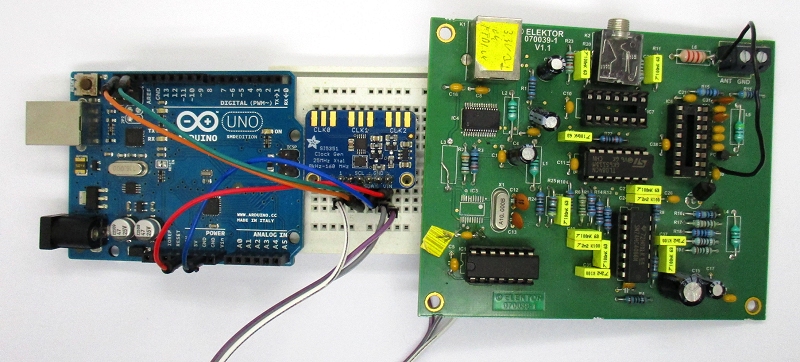
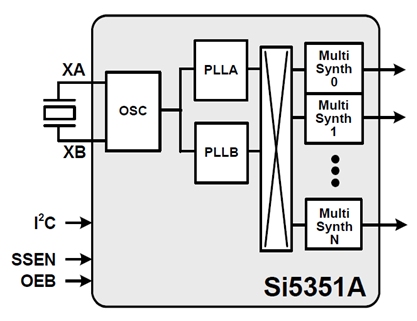
Der SI5351 hat einen Quarzoszillator
mit 25 MHz und zwei PLLs, die zwischen 600 MHz und 900 MHz eingestellt werden
können. Die PLL-Teiler arbeiten mit gebrochenen Teilerverhältnissen, sodass
tatsächlich eine fast beliebige Auflösung möglich ist. Der folgende
MultiSynth-Teiler verwendet ebenfalls gebrochene Teilerverhältnisse. Damit hat
man zwei Möglichkeiten, die Wunschfrequenz zu erzeugen.
A) Man kann die PLL fest auf z.B. 900 MHz einstellen und dann mit gebrochenen
Zahlen herunterteilen.
B) Man kann die PLL kleinschrittig einstellen und dann ganzzahlig auf die
Endfrequenz teilen.
Hier zunächst die Methode A. Die VFO-Frequenz liegt beim Vierfachen der
Mischerfrequenz, die 12 kHz unterhalb der Empfangsfrequenz steht. Das Programm
soll die Empfangsfrequenz in kHz im Textformat empfangen und umsetzen. Um 3500
kHz zu empfangen muss der Si5351 eine Ausgangsfrequenz von 4*(3500-12)
kHz = 13952 kHz am Ausgang 1 erzeugen. Der PLL-Teiler wird auf 36 gestellt (25
MHz * 36 = 900 MHz). Der Multisynth-Teiler auf 900000/13952 =
64,506. Mit der Methode kommt man runter bis 1 MHz. Für noch kleinere Frequenzen
wird der zusätzliche R_DIV-Teiler durch 16 eingesetzt.
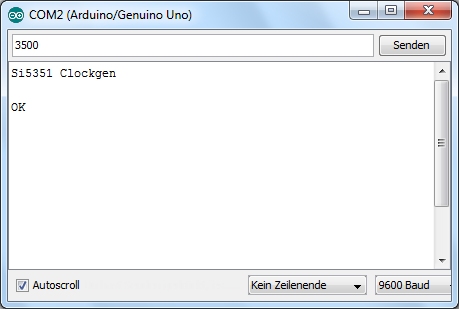
//SI5351_vfo PLL fixed at 900 MHz
#include <Adafruit_Sensor.h>
#include <Wire.h>
#include <Adafruit_SI5351.h>
Adafruit_SI5351 clockgen = Adafruit_SI5351();
void setup(void)
{
Serial.begin(9600);
Serial.println("Si5351 Clockgen"); Serial.println("");
/* Initialise the sensor */
if (clockgen.begin() != ERROR_NONE)
{
Serial.print("Error");
while(1);
}
Serial.println("OK");
clockgen.enableOutputs(true);
clockgen.setupPLL(SI5351_PLL_A, 36, 0, 1000); //900 MHz
setfreq (6000);
}
void setfreq (unsigned long freq)
{
unsigned long f2;
unsigned long f3;
unsigned long f4;
unsigned long f5;
unsigned long div2;
unsigned int Teiler2;
unsigned int rdiv;
if (freq > 0) {
f2=(freq-12)*4;
if (f2<1000) {
rdiv = 16;
f2 = f2 * 16;
}
else {
rdiv = 1;
}
div2 = 900000000/f2;
f4 = div2/1000;
f5=div2-(f4*1000);
clockgen.setupMultisynth(1, SI5351_PLL_A, f4, f5, 1000);
if (rdiv == 16) {
clockgen.setupRdiv(1, SI5351_R_DIV_16);
}
if (rdiv == 1) {
clockgen.setupRdiv(1, SI5351_R_DIV_1);
}
}
}
void loop(void)
{
unsigned long freq;
if (Serial.available()) {
freq = Serial.parseInt();
setfreq (freq);
}
}
//SI5351_vfo, variable PLL
#include <Adafruit_Sensor.h>
#include <Wire.h>
#include <Adafruit_SI5351.h>
Adafruit_SI5351 clockgen = Adafruit_SI5351();
void setup(void)
{
Serial.begin(9600);
Serial.println("Si5351 VFO"); Serial.println("");
if (clockgen.begin() != ERROR_NONE)
{
Serial.print("Error");
while(1);
}
Serial.println("OK");
clockgen.enableOutputs(true);
setfreq (6000);
}
void setfreq (unsigned long freq)
{
unsigned long f2;
unsigned long f3;
unsigned long f4;
unsigned long f5;
unsigned int Teiler2;
unsigned int rdiv;
if (freq > 0)
{
f2=(freq-12)*4;
// f2=freq;
if (f2>120000) {
f2=120000;
}
if (f2<800) {
rdiv = 16;
f2 = f2 * 16;
}
else {
clockgen.setupRdiv(1, SI5351_R_DIV_1);
rdiv = 1;
}
if (f2 >= 100000) {
Teiler2 = 6;
}
if (f2 < 90000) {
Teiler2 = 10;
}
if (f2 < 60000) {
Teiler2 = 15;
}
if (f2 < 50000) {
Teiler2 = 18;
}
if (f2 < 45000) {
Teiler2 = 20;
}
if (f2 < 30000) {
Teiler2 = 30;
}
if (f2 < 20000) {
Teiler2 = 45;
}
if (f2 < 15000) {
Teiler2 = 60;
}
if (f2 < 10000) {
Teiler2 = 90;
}
if (f2 < 6000) {
Teiler2 = 150;
}
if (f2 < 4000) {
Teiler2 = 220;
}
if (f2 < 2700) {
Teiler2 = 330;
}
if (f2 < 1800) {
Teiler2 = 500;
}
if (f2 < 1500) {
Teiler2 = 600;
}
if (f2 < 1000) {
Teiler2 = 900;
}
f2=f2*Teiler2;
f2=f2*1000/25;
f3=f2 /1000;
f4 = f3/1000;
f5=f3-(f4*1000);
clockgen.setupPLL(SI5351_PLL_A, f4, f5, 1000);
clockgen.setupMultisynth(1, SI5351_PLL_A, Teiler2, 0, 2);
if (rdiv == 16) {
clockgen.setupRdiv(1, SI5351_R_DIV_16);
}
}
}
void loop(void)
{
unsigned long freq;
if (Serial.available()) {
freq = Serial.parseInt();
setfreq (freq);
}
}
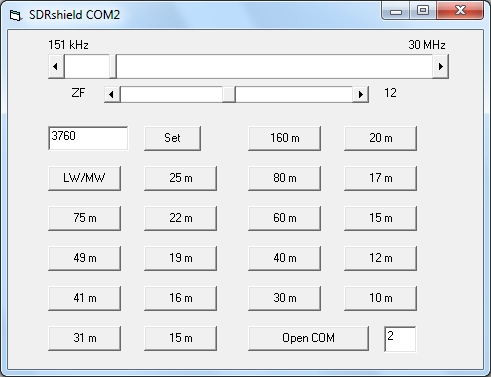
Private Sub Command1_Click()
f = Int(Val(Text4.Text) / 5)
HScroll1.Value = f
End Sub
Private Sub Command10_Click()
f = 17480
HScroll1.Value = f / 5
End Sub
Private Sub Command11_Click()
f = 18900
HScroll1.Value = f / 5
End Sub
Private Sub Command12_Click()
f = 28000
HScroll1.Value = f / 5
End Sub
Private Sub Command13_Click()
f = 24900
HScroll1.Value = f / 5
End Sub
Private Sub Command14_Click()
f = 21000
HScroll1.Value = f / 5
End Sub
Private Sub Command15_Click()
f = 18060
HScroll1.Value = f / 5
End Sub
Private Sub Command16_Click()
f = 5000
HScroll1.Value = f / 5
End Sub
Private Sub Command17_Click()
f = 14000
HScroll1.Value = f / 5
End Sub
Private Sub Command18_Click()
f = 10100
HScroll1.Value = f / 5
End Sub
Private Sub Command19_Click()
f = 7000
HScroll1.Value = f / 5
End Sub
Private Sub Command2_Click()
f = 531
HScroll1.Value = f / 9
End Sub
Private Sub Command20_Click()
f = 3500
HScroll1.Value = f / 5
End Sub
Private Sub Command21_Click()
f = 1810
HScroll1.Value = f / 5
End Sub
Private Sub Command3_Click()
f = 3900
HScroll1.Value = f / 5
End Sub
Private Sub Command4_Click()
f = 7200
HScroll1.Value = f / 5
End Sub
Private Sub Command5_Click()
f = 9400
HScroll1.Value = f / 5
End Sub
Private Sub Command6_Click()
f = 11600
HScroll1.Value = f / 5
End Sub
Private Sub Command7_Click()
f = 5900
HScroll1.Value = f / 5
End Sub
Private Sub Command8_Click()
f = 13570
HScroll1.Value = f / 5
End Sub
Private Sub Command9_Click()
f = 15100
HScroll1.Value = f / 5
End Sub
Private Sub Form_Load()
OPENCOM "COM2:9600, N, 8, 1"
TIMEINIT
DTR 1
DELAY 1000
DTR 0
End Sub
Private Sub HScroll1_Change()
n = HScroll1.Value
If n > 179 Then f = n * 5
If n < 180 Then f = n * 9
Text4.Text = f
vfo = f '(f + 12) * 4
Text = Str(vfo)
l = Len(Text)
For n = 1 To l
ch = Mid$(Text, n, 1)
SENDBYTE Asc(ch)
Next n
SENDBYTE 13
SENDBYTE 10
DELAY 100
End Sub
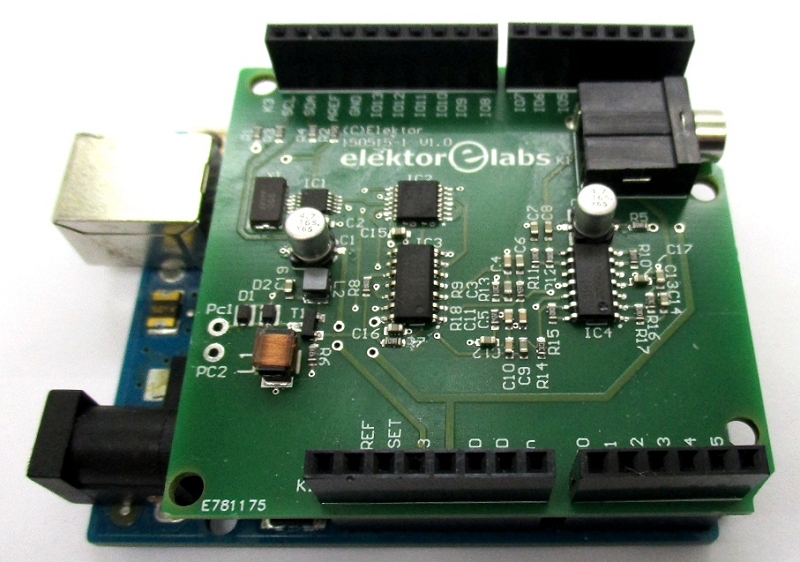
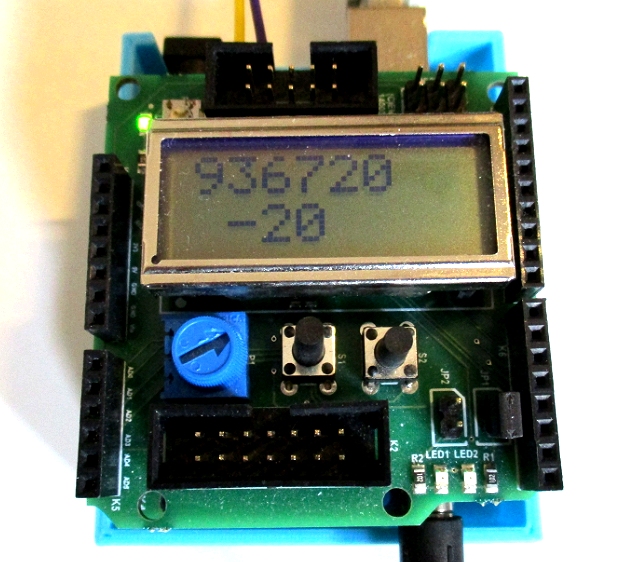
//SI5351_vfo + LCD PLL fixed at 900 MHz
#include <Adafruit_Sensor.h>
#include <Wire.h>
#include <Adafruit_SI5351.h>
#include <LiquidCrystal.h>
Adafruit_SI5351 clockgen = Adafruit_SI5351();
LiquidCrystal lcd(2,3,4,5,6,7);
unsigned long freq;
unsigned long freqHz;
int pot;
long fstep;
long fstepOld;
void setup(void)
{
Serial.begin(9600);
Serial.println("Si5351 Clockgen"); Serial.println("");
/* Initialise the sensor */
if (clockgen.begin() != ERROR_NONE)
{
Serial.print("Error");
while(1);
}
Serial.println("OK");
clockgen.enableOutputs(true);
clockgen.setupPLL(SI5351_PLL_A, 36, 0, 1000); //900 MHz
freq=7000;
freqHz=freq*1000;
setfreq (freqHz);
lcd.begin(16, 2);
// Print a message to the LCD.
lcd.print(freq);
pinMode(A0, INPUT_PULLUP);
pinMode(A1, INPUT_PULLUP);
}
void setfreq (unsigned long freqHz)
{
unsigned long f2;
unsigned long f3;
unsigned long f4;
unsigned long f5;
unsigned long div2;
// unsigned int Teiler2;
unsigned int rdiv;
if (freqHz > 0) {
f2=freqHz*4;
if (f2<1000000) {
rdiv = 16;
f2 = f2 * 16;
}
else {
rdiv = 1;
}
div2 = 9000970000000/f2;
f4 = div2/10000;
f5=div2-(f4*10000);
clockgen.setupMultisynth(1, SI5351_PLL_A, f4, f5, 10000);
if (rdiv == 16) {
clockgen.setupRdiv(1, SI5351_R_DIV_16);
}
if (rdiv == 1) {
clockgen.setupRdiv(1, SI5351_R_DIV_1);
}
}
}
void loop(void)
{
pot = analogRead(A3);
fstep =1000000;
if (pot > 100) fstep =1000000;
if (pot > 200) fstep =500000;
if (pot > 300) fstep =100000;
if (pot > 400) fstep =20000;
if (pot > 500) fstep =5000;
if (pot > 600) fstep =1000;
if (pot > 700) fstep =200;
if (pot > 800) fstep =100;
if (pot > 900) fstep =20;
if (fstep != fstepOld){
lcd.setCursor(1, 1);
lcd.print(fstep);
lcd.print (" ");
}
fstepOld = fstep;
if (Serial.available()) {
freq = Serial.parseInt();
if (freq > 0){
lcd.setCursor(0, 0);
freqHz=freq*1000-12000;
lcd.print(freq);
lcd.print (" ");
setfreq (freqHz);
}
}
if (digitalRead(A0)==0){
freqHz = freqHz - fstep;
lcd.setCursor(0, 0);
//freq=freqHz/1000;
lcd.print(freqHz);
setfreq (freqHz);
lcd.print (" ");
delay (200);
}
if (digitalRead(A1)==0){
freqHz = freqHz + fstep;
lcd.setCursor(0, 0);
//freq=freqHz/1000;
lcd.print(freqHz);
setfreq (freqHz);
lcd.print (" ");
delay (200);
}
}